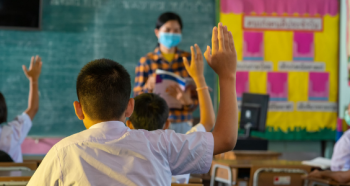John Dewey [1859-1952] an influential philosopher, psychologist and educational thinker, published his book on Democracy and Education: An Introduction to the Philosophy of Education in 1916. One hundred years later what is the relevance of Dewey’s work in general, and this book in particular?
John Dewey [along with Lev Vigotsky and Jean Piaget] is often considered as the father of constructivism. He believed that learning is a social, communal process requiring students to construct their own understanding based on personal experience. “No thought, no idea, can possibly be conveyed as an idea from one person to another…..only by wrestling with the conditions of the problem first hand, seeking and finding his[her] own way out, does he [she] think.….the joy which children themselves experience is the joy of intellectual constructiveness.” [Dewey 1916, p166]
The importance of inquiry as an instructional approach
Dewey emphasised the importance of inquiry as an instructional approach and has become associated with the discovery of learning and child-centred, progressive teaching approaches. While he certainly believed education needs to connect learning to the real world experience of learners and be child-centred, he also emphasised the importance of a rigorous curriculum that developed powerful methodologies and knowledge. Dewey was uncomfortable with some of the more extreme progressive pedagogical approaches that became associated with his name.
Dewey believed developing intellectual powers is a necessary but not a sufficient goal of education. Schooling must equip young people to live a fulfilled life and become life-long learners, able to fulfil their potential and contribute to society. Dewey was alarmed that schools failed in this regard, promoting passive and compliant pupils rather than reflective, autonomous, informed decision makers. He believed one absolutely critical function of education is to develop the intellect, motivation and wisdom of young people so that they become ‘mature’ and effective citizens able to transmit culture from one generation to the next and transform it in the face of change: “What nutrition and reproduction are to physiological life, education is to social life.”
The link between democracy and education
What is particularly interesting about this book is the link Dewey highlights between democracy and education reflecting his advocacy of democracy. Democracy is not only about extending voting rights, a big issue in 1916, but also equipping citizens with the ability to take on the responsibility to make informed, intelligent choices and decisions leading to the public good. He believed that democracy is not just a political system but an ethical ideal with active informed participation by citizens.. Established beliefs and theories should be critically questioned and revised in the light of developments, pragmatically evolving to meet the needs of changing times. If democracy is to work it required informed, knowledgeable and wise citizens and, therefore, education has a moral purpose. Classroom teachers and schools have a responsibility to nurture character as well as teach knowledge and skills.
Dewey stressed that education has to prepare students for an uncertain future and, therefore, a high priority should be given to developing effective habits and the ability to adapt and learn how to learn. This is notable given the fact that during his lifetime, with the notable exception of the great depression and two world wars, life for most people was comparatively predictable. Industrialisation and mass production meant many people had a job for life and emphasis in education was on preparing individuals for their respective roles in a fairly predictable workplace. The modern globalised world is by contrast highly unpredictable. Individuals often have little job security and multiple careers, and coping with uncertainty well has never been more important.
Teachers were viewed by Dewey as needing to be creative professionals demonstrating not only understanding of their subject matter but a passion for knowledge, intellectual curiosity, an understanding of the learning process and the children in their care. Dewey understood that excellent teachers responded quickly to student responses as indications of their current level of understanding, a direct consequence of constructivism.
Dewey’s understanding of constructivism as a theory explaining how deep learning happens, further developed by Vygotsky and others, has become the established paradigm. Consequences, now widely recognised, include engaging and challenging students, relating learning to experience and listening to the voice of the learner in order to understand students’ thinking and adjust teaching accordingly. Dewey’s concern that a focus on the learner’s interests needs to be balanced with the need to develop powerful knowledge and understanding continues to matter today in debates about how to organise the curriculum.
As we move into the uncertain global information age perhaps Dewey’s concern with the relationship between effective democracy and education is his most important lesson. It has never been more important to help the young cope with uncertainty well, to learn how to learn for life, and to understand that education is a moral enterprise concerned with developing informed citizens capable of making informed choices and decisions.





